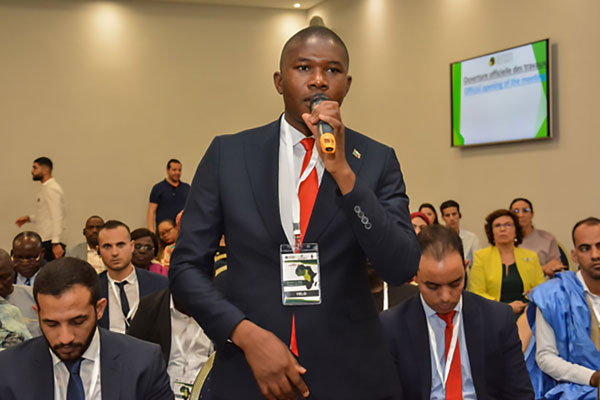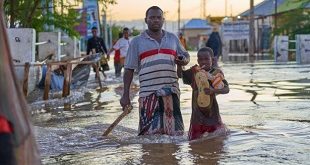
A young mayor taps into the burgeoning power of Africa’s youth in order to bring change – including digitisation – to a city in Eastern Zambia.
SPECIAL REPORT | BIRD AGENCY | The sun is casting long shadows over Chipata, a small but busy city in Zambia’s Eastern Province when a young man in a tastefully furnished room looks up from his work. This is the office of Zambia’s youngest-ever mayor and the walls are hung with the national flag and many photos of the young man hard at work across his constituency. George Mwanza might not be sitting in his office, however, if it were not for an event that took place when he was just a boy, living in the far-off village of Ngocho.
Mwanza recounts how growing up poor in Ngocho, a village set amidst beautiful rolling hills and fields, he was able to go to school only because of the benevolence of an uncle. Then, disaster struck his family.
After years of scraping together savings from her vegetable trade, Mwanza’s mother, a vegetable trader, had acquired a small piece of land. However, a group of political cadres forcibly seized the land. Witnessing his mother’s struggle and suffering profoundly affected him, Mwanza recounts. He felt a growing sense of determination to confront the injustice done to his mother and to many women like her.
The struggle for an education
Another obstacle loomed when Mwanza reached Grade 10. At the time, he was attending Chizongwe Technical Boarding School where he was expected to complete his secondary school education. However, the uncle who had been sponsoring his education lost his job. The setback left Mwanza with no apparent means to continue at school. He faced the very real possibility of having to drop out and return to his village. Fate, however, had other ideas.
An academic initiative designed to empower academically gifted students was being held across the country. Each province held its own competition and his school nominated Mwanza as their representative to the Young Achievers Zambia event. Understanding that victory was essential, Mwanza took part and pulling out all the stops, emerged as the first-place winner.
With the prize money from the program – an initiative of the United Nations and Barclays Bank – he was able to pay his fees for the remaining years of his school education, including examination fees, upfront. He also saved some money from the prize money for his travel home after completing school.
Evolution from adversity to determination and triumph
At school, the young Mwanza served as the president of the Junior Engineers, Technicians and Scientists (JETS) club – a school club that has been in existence in Zambian high schools for over 50 years, as well as the vice president of the debating club and the president of the Youth Development Foundation. The experiences served to reinforce his belief that he could affect change and inspire others, he explained.
After studying commerce at university, he set up a business consultancy, then went back to studying, signing up for a BSc in Public Administration and Governance at Zambia Open University. When he graduates in 2024. He will be 30.
In January 2016, Zambia’s then-president, Edgar Lungu, signed into law an act that made the position of mayor an electoral position. Mwanza, at the time just 22, had become deeply concerned about the lack of sanitation facilities in markets where women marketers like his mother struggled to meet their basic needs, despite the council collecting fees from them.
Vying for the position of mayor resonated with him, as it promised a unique chance to address the problems of the poorest in the city’s compounds. However, there was a significant obstacle in his path.
The ruling party at the time, the Patriotic Front, rejected him. They dismissed him as too young, too inexperienced, and without the deep pockets they felt he needed. His youth was viewed as a liability rather than an asset.
That was something that Mwanza was determined to change.
Running as an Independent
After being denied a position in 2016, Mwanza made a promise to himself: if the established political parties would not support him, he would run as an independent candidate, driven solely by the people’s power and by building trust. Between 2016 and 2021, he developed a five-year plan to prepare himself and establish a solid foundation for his campaign.
Running as an independent candidate posed unique challenges. Established political parties had access to more resources and funding. Mwanza relied on the energy and dedication of his youthful supporters, who believed in his vision and were hungry for change.
When the 2021 elections finally arrived, Mwanza, now 27, ran against a strong tide of political opinion and scepticism. Despite personalised, derogatory campaigns targeting his age and inexperience, Mwanza held on and his support base stood by him.
The election results spoke volumes – he secured a resounding victory, with more than 27,000 votes separating him from the second-place candidate. He didn’t see his triumph as his own, though; he saw it as a triumph for the youth, for the women and for the dreamers of Chipata, of Zambia, and of Africa.
“My proudest moment is bringing the office of the mayor closer to the people because it is their office and I am the peoples’ mayor,” he said of the victory.
The challenges the young contender faced didn’t disappear after the campaign, however. When he assumed office, Mwanza faced resistance from older members of the local government who questioned his ability.
“I think the challenge is that political parties are more rigid in Zambia when it comes to age, this is why they need to have leadership training programmes to train the youth in their ranks. We need more youth leaders. They have more energy and ideas to lead us into the future. We always say young people are the future, but they are also the now, so we need them to be fully involved in leadership,” offered Zambian political analyst and University of Zambia lecturer, Alex Ngoma.
Mwanza’s answer was to ensure his actions demonstrated positive change.
A City in Need
As mayor, Mwanza embarked on a mission to transform Chipata. He addressed critical issues that had long plagued the city. One of his earliest achievements was clearing salary arrears for city workers, who had endured ten months without pay. This single accomplishment not only relieved the workers of their financial burden but also rebuilt their trust in the local government.
Waste management was another persistent problem faced by the city. Chipata had been without a proper dumping site for fifteen years, polluting the city’s main water source. Mwanza opened a new dumping site, paving the way for recycling initiatives and waste reduction.
He also recognised the need for modernised services. Through his efforts, the city began transitioning to e-government service delivery, enabling quicker responses to service requests and inquiries. A partnership with a German city led to the acquisition of fifty laptops for the city, which aided in digitalization efforts and enhanced transparency and revenue generation while improving service delivery.
One of the most significant new projects was the construction of soon-to-be commissioned modern restrooms in the market.
According to Ngoma, Mayor Mwanza’s election has heralded a new dawn for Chipata.
“The one thing about Mayor Mwanza is that he is proving that young people can do it. He resolved issues at the Chipata City Council, and the town is more vibrant as a result. He is really showing us that young people are capable of leading,” he said.
Yet the young mayor’s vision extends well beyond his initial successes. He aspires to transform Chipata into a model city that addresses issues like climate change, has a new road infrastructure, and achieves full digitalization to enhance services and value for the city’s residents. His dream is to create a city where families can thrive and young innovators can discover endless opportunities.
Amplifying youth activism
Mwanza’s active involvement in the Young Elected Officials of Africa (YELO) African mayor network highlights his dedication to regional unity and youth empowerment. As vice president at the African level and leader for Southern Africa, Mwanza has been able to amplify the voice of youth leadership.
His journey also exemplifies the immense potential of youth in leadership roles and underscores the reality that young leaders, armed with determination and community support, can wield a profound influence.
“Mayor George Mwanza serves as an inspiring young leader whose unwavering commitment to education and literacy shines brightly. While the USAID Let’s Read Project tirelessly strives to enhance reading proficiency among early-grade students from pre-primary through grade 3, Mayor Mwanza has also been actively involved in supporting local schools by providing them with access to safe drinking water. His contributions include the installation of several boreholes to ensure schools have a reliable water source. Both on a project-wide and personal scale, he has passionately championed the cause of our educational institutions,” commented Godfrey Chitalu, the Eastern Province Office Manager for the USAID Let’s Read project.
But Mwanza’s is part of a far wider story, according to Ngoma.
“His victory, I think, is part of a bigger movement from around the world. Young people are assuming political seats, so the Zambian political landscape is also changing due to this global change occurring. Young Zambians are seeing their global peers get into political seats, this is encouraging them to vote for each other,” he shared.
Meanwhile, Chipata has discovered a symbol of hope.
“My greatest source of pride lies in bridging the gap between the mayor’s office and the people, for it is their office, and I am undeniably the people’s mayor,” Mwanza said.
*****
SOURCE: bird story agency
 The Independent Uganda: You get the Truth we Pay the Price
The Independent Uganda: You get the Truth we Pay the Price


